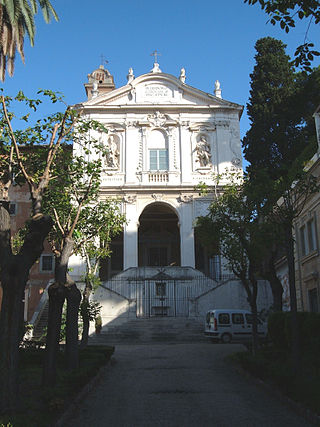
Pope Nicholas IV, born Girolamo Masci, was head of the Catholic Church and ruler of the Papal States from 22 February 1288 to his death, on 4 April 1292. He was the first Franciscan to be elected pope.
Peter John Olivi, also Pierre de Jean Olivi or Petrus Joannis Olivi, was a French Franciscan theologian and philosopher who, although he died professing the faith of the Roman Catholic Church, remained a controversial figure in the arguments surrounding poverty at the beginning of the 14th century. In large part, this was due to his view that the Franciscan vow of poverty also entailed usus pauper. While contemporary Franciscans generally agreed that usus pauper was important to the Franciscan way of life, they disagreed that it was part of their vow of poverty. His support of the rigorous view of ecclesiastical poverty played a part in the ideology of the groups coming to be known as the Spiritual Franciscans or Fraticelli.

Luke Wadding, O.F.M., was an Irish Franciscan friar and historian.
Guillaume-Gabriel Nivers was a French organist, composer and theorist. His first livre d'orgue is the earliest surviving published collection with traditional French organ school forms. Nivers's other music is less known; however, his treatises on Gregorian chant and basso continuo are still considered important sources on 17th century liturgical music and performance practice.
The Recollects were a French reform branch of the Friars Minor, a Franciscan order. Denoted by their gray habits and pointed hoods, the Recollects took vows of poverty and devoted their lives to prayer, penance, and spiritual reflection. Today, they are best known for their presence as missionaries in various parts of the world, most notably in early Canada.
John of Parma was an Italian Franciscan friar, who served as one of the first Ministers General of the Order of Friars Minor (1247–1257). He was also a noted theologian of the period.
Peter of Aquila (Scotellus) was an Italian Friar Minor, theologian and bishop.

Bonaventure Baron was a distinguished Irish Franciscan friar and a noted theologian, philosopher, teacher and writer of Latin prose and verse.

Dom Thierry Ruinart (1657–1709) was a French Benedictine monk and scholar. He was a Maurist, and a disciple of Jean Mabillon. Of his many works, the one now cited is his Acta sincera, a martyrology, written in Latin. His work is one of the main sources of Alphonsus Liguori's "Victories of the Martyrs". He was also interested in oenology. In 1729 his nephew Nicolas Ruinart founded the champagne house of Ruinart, which operates to this day (2007).
Bernard of Besse was a French Friar Minor and chronicler.

Matthew of Aquasparta was an Italian Friar Minor and scholastic philosopher. He was elected Minister General of the Order.

Cristoforo Numai was an Italian Franciscan, who became minister general of the Friars Minor and a cardinal.
Marianus of Florence was a Friar Minor, historian, and chronicler of the Franciscan Order; born in Florence about the middle of the fifteenth century, exact date of birth uncertain; died there, 20 July 1523.
Jean de La Haye was a French Franciscan preacher and Biblical scholar.
Antony Hickey was an Irish Franciscan theologian.
Oliver Maillard was a Breton Franciscan preacher.

Francesco Panigarola was an Italian Franciscan preacher and controversialist, and Bishop of Asti.
Thomas Bourchier was an English Observantine Franciscan and martyologist.

Sant'Isidoro a Capo le Case is a Roman Catholic church, monastic complex and college of the Franciscan Order, in the Ludovisi district on the Pincian Hill in Rome. It contains the Cappella Da Sylva, designed by Gian Lorenzo Bernini, who also designed the funerary monument of his son Paolo Valentino Bernini in it. Since 2017 San Patrizio a Villa Ludovisi became the national church of the United States, Sant'Isidoro has become the National Church of Ireland in Rome.

Pasteur de Sarrats was a French Franciscan friar, bishop and Cardinal. He was born in the village of Aubenas in the Vivarais, or he took his monastic vows in the monastery of Aubenas. Pasteur may have had a brother. A bull of Benedict XII, dated 13 April 1337, grants the parish church of S. Martin de Valle Gorgia in the diocese of Viviers to Pierre de Serraescuderio, Canon of Viviers since 1333, who held a parish of S. Pierre de Melon in the diocese of Uzès. Pasteur died in Avignon in 1356.








